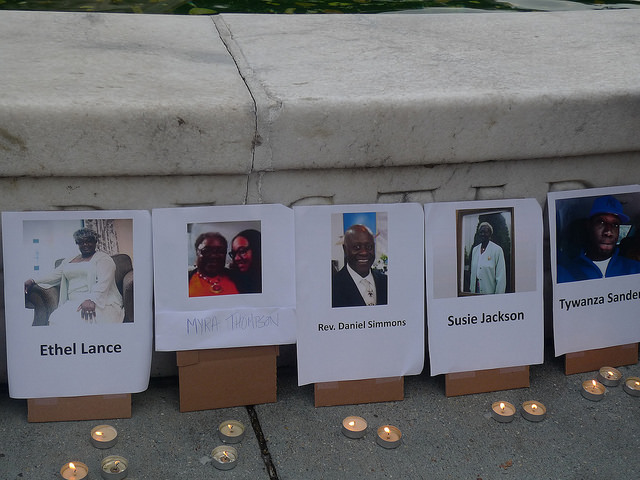“It’s me, it’s me, it’s me O Lord, standing in the need of prayer.”
– old-time gospel song
“Truly, I say to you, all sins will be forgiven the sons of men, and whatever blasphemies they utter; but whoever blasphemes against the Holy Spirit never has forgiveness but is guilty of an eternal sin.”
– Mark 3: 28-29
All houses of worship are sanctuaries, but the concept of sanctuary holds particular resonance in Black Church tradition on account of the church’s role as the one institution white people could not take completely away from the persons whom they never ceased to abuse in the most un-Christian ways imaginable.
It is nevertheless true that the original African Church in Charleston was burned to the ground by whites following a major 1822 slave uprising when it was discovered that long-time church member and class leader (and free person of color) Denmark Vesey had been preaching insurrection there.
And now, in a distinctively American drama that never ends, the historic and brave Emanuel (“God with us”) African Methodist Episcopal Church in Charleston has been violated yet again, almost 200 years later, by murderous anti-black hatred.
Very often shooting rampages in this country are described as acts of “senseless” violence, and commentators insist that it is impossible to imagine the mental state of “someone who would do such a thing.”
But when black people are slaughtered by white supremacists, we in fact do know something about the mind of the perpetrators. We know that these are people gripped by fear and rage. Fear that their own insecurities and crimes will be found out, and rage against black people for unfailingly bearing silent witness to these same insecurities and crimes.
As James Baldwin and many others have observed, the presence of black people and the ordeal of black people in the United States stand as a mighty rebuke to anything remotely flattering that the white man wishes to think about himself: all of the white man’s notions of his courage, his generosity, and his Christian love get shattered to pieces by the mirror black people hold up to his craven, thieving, hate-distorted face.
In Down at the Cross (1962), Baldwin writes of “the white man’s profound desire not to be judged by those who are not white, not to be seen as he is…and at the same time the white man’s equally profound need to be seen as he is, to be released from the tyranny of the mirror.”
Baldwin continues:
All of us know, whether or not we are able to admit it, that mirrors can only lie, that death by drowning is all that awaits us there. It is for this reason that love is so desperately sought and so cunningly avoided. Love takes off the masks that we fear we cannot live without and know we cannot live within. I use the word ‘love’ here not merely in the personal sense but as a state of being, or a state of grace–not in the infantile American sense of being made happy but in the tough and universal sense of quest and daring and growth. And I submit, then, that the racial tensions that menace Americans today have little to do with real antipathy–on the contrary, indeed–and are involved only symbolically with color. These tensions are rooted in the very same depths as those from which love springs, or murder. The white man’s unadmitted–and apparently, to him, unspeakable–private fears and longings are projected onto the Negro.”
Baldwin tells the hard truth that American white people cannot know and love themselves, cannot forgive themselves in the Christian sense of forgiveness, unless and until they know and love the American black people with whom their own identity is so closely interwoven.
There is little doubt that the killer was projecting his private fears and longings when he shouted to the people in that Emanuel sanctuary who were begging him to stop, “You rape our women and you’re taking over our country. And you have to go.”
“You have to go.” How many white men, all bearing the mark of Cain, have murdered their brothers and sisters because the very existence of a dark-skinned sibling–a sibling possibly more beloved of God than they–became intolerable?
Elsewhere in his writings, James Baldwin celebrates the beauty and grace of American black people who have known the worst and survived the worst and yet have still managed to love and be loved, have still made a way where there was no way. And for all of his own struggles with the church, Baldwin also writes movingly of the inexpressible loveliness and dignity of the sanctified.
It seems to me that it must have been this very loveliness and dignity that affronted the killer: that so affronted him that he found it possible to enter a prayer meeting with murderous intent.
Christian theologians still argue about what exactly is meant by “the sin against the Holy Spirit” that three of the four gospels mention. But because in these texts the accusers and enemies of Jesus are murmuring that he, the one who casts out demons, is himself demon-possessed, it seems fairly clear that what is indicated in committing the one unforgivable sin is projecting onto others one’s own sickened and corrupted and demonic heart.
James Baldwin wrote long ago that we cannot achieve our country until white people, in effect, come to the cross and lay their burden down.
And when, exactly, will that be?


